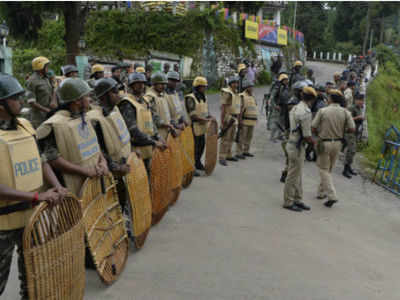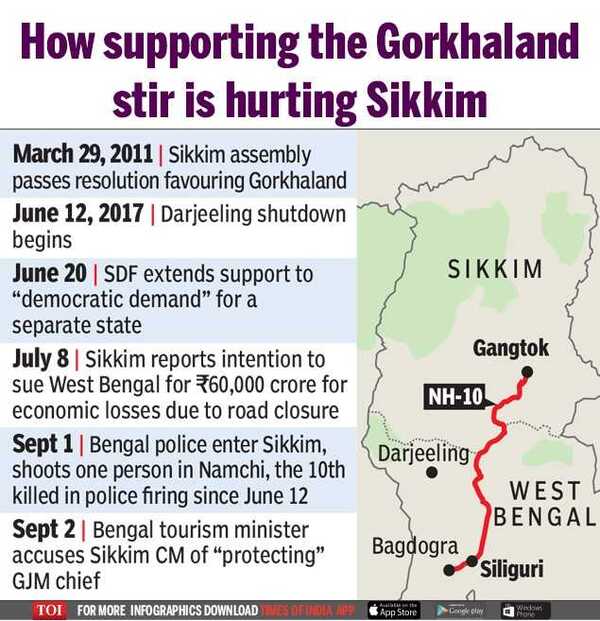- News
- India News
- Paradise Imperiled: Sikkim pays price for Gorkhaland
Trending
This story is from September 9, 2017
Paradise Imperiled: Sikkim pays price for Gorkhaland
Sandwiched between China to the north and West Bengal to the south, the land-locked state of Sikkim has been brought to its knees as the Gorkhaland shutdown approaches a record-breaking three months. Tourism, one of the primary sources of income for Sikkim, has been hard hit

Security personnel in Mirik
Key Highlights
- Apart from tourism, Sikkim's development has also been hit
- The state’s only lifeline to the outside world, National Highway 10, remains open
- But 70 km of the road lying fall in strife-torn Darjeeling and Kalimpong
GANGTOK: Suraj Biswakarma is a worried man. The flourishing tourism business in Sikkim that was raking in big bucks for many like him has dried up, thanks to the neighbouring hills of Darjeeling shutting down to press its demand for separate statehood .
During the tourist season, the 33-year-old taxi driver from Gangtok easily made Rs 70,000 a month, but this year he has barely managed Rs 25,000.
“Our biggest festival (Dashain) is around the corner. Every year I visit my in-laws with gifts. I don’t know what my family and I will do this time,” he said.
Sandwiched between China to the north and West Bengal to the south, the land-locked state of Sikkim has been brought to its knees as the Gorkhaland shutdown approaches a record-breaking three months. The state’s only lifeline to the outside world, National Highway 10, remains open, but with 70km of it lying in Darjeeling and Kalimpong and reports of violence in the hills, tourists have kept away.

Tourism may have been the hardest hit, but virtually no other sector has remained unaffected either.
“ Sikkim’s development has slowed down as we depend on Siliguri for all our resources,” said former tourism minister KT Gyaltsen, now legal advisor to the ruling Sikkim Democratic Front party.
“The construction industry is affected. We have children studying in Darjeeling schools. People have taken a lot of loans and many of our youth are dependent on the tourism industry. It (the shutdown) has hit our economy.” Tourism secretary Chewang Zangpo pointed out that between January and June this year, tourist footfall in the state hit a record 11.75 lakh, which included 31,000 foreigners, and then fell sharply.
“Sikkim has been grossly affected. Although the national highway was always open, many countries started issuing advisories cautioning their citizens to avoid our state,” he said.
The price that Sikkim is paying for the Darjeeling cause may be putting a strain on the overwhelming support it extended to its neighbour at the start of this latest round of agitation. What was initially a display of solidarity for neighbours of a similar culture, rapidly digressed into alarm as Sikkim vehicles came under attack across the border.
As income from the tourism sector. which has been flourishing in the past decade, remains non-existent, frustration is on the rise. Gyalsten has a logical explanation for Sikkim’s support for the cause. “If we had stayed silent, disturbance would have started right from Rangpo (the town bordering West Bengal). Our message was ‘We support the movement and now leave us alone,’” he said. Pintso Chopel, Sikkim Democratic Front MLA Gangtok echoes a similar sentiment. “Our sympathy is always there but we want the problem solved as early as possible,” he said.
During the tourist season, the 33-year-old taxi driver from Gangtok easily made Rs 70,000 a month, but this year he has barely managed Rs 25,000.
“Our biggest festival (Dashain) is around the corner. Every year I visit my in-laws with gifts. I don’t know what my family and I will do this time,” he said.
Sandwiched between China to the north and West Bengal to the south, the land-locked state of Sikkim has been brought to its knees as the Gorkhaland shutdown approaches a record-breaking three months. The state’s only lifeline to the outside world, National Highway 10, remains open, but with 70km of it lying in Darjeeling and Kalimpong and reports of violence in the hills, tourists have kept away.

Tourism may have been the hardest hit, but virtually no other sector has remained unaffected either.
“ Sikkim’s development has slowed down as we depend on Siliguri for all our resources,” said former tourism minister KT Gyaltsen, now legal advisor to the ruling Sikkim Democratic Front party.
“The construction industry is affected. We have children studying in Darjeeling schools. People have taken a lot of loans and many of our youth are dependent on the tourism industry. It (the shutdown) has hit our economy.” Tourism secretary Chewang Zangpo pointed out that between January and June this year, tourist footfall in the state hit a record 11.75 lakh, which included 31,000 foreigners, and then fell sharply.
“Sikkim has been grossly affected. Although the national highway was always open, many countries started issuing advisories cautioning their citizens to avoid our state,” he said.
The price that Sikkim is paying for the Darjeeling cause may be putting a strain on the overwhelming support it extended to its neighbour at the start of this latest round of agitation. What was initially a display of solidarity for neighbours of a similar culture, rapidly digressed into alarm as Sikkim vehicles came under attack across the border.
As income from the tourism sector. which has been flourishing in the past decade, remains non-existent, frustration is on the rise. Gyalsten has a logical explanation for Sikkim’s support for the cause. “If we had stayed silent, disturbance would have started right from Rangpo (the town bordering West Bengal). Our message was ‘We support the movement and now leave us alone,’” he said. Pintso Chopel, Sikkim Democratic Front MLA Gangtok echoes a similar sentiment. “Our sympathy is always there but we want the problem solved as early as possible,” he said.
End of Article
FOLLOW US ON SOCIAL MEDIA










